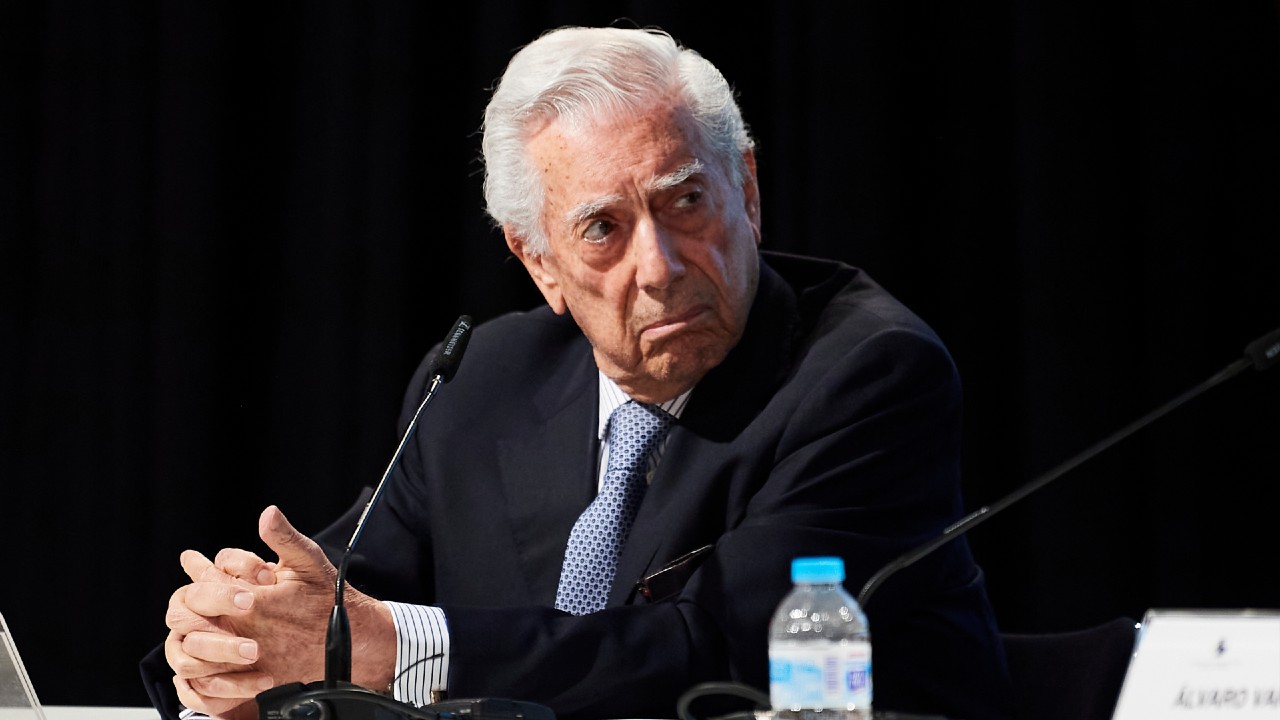
Mario Vargas Llosa, a rival of former president Alberto Fujimori in the 90s indicated his support for Keiko Fujimori. Photo: Getty Images.
Mario Vargas Llosa urged Peruvians to vote for Keiko Fujimori
Mario Vargas Llosa has spoken out about the Peruvian presidential elections and hasked citizens to vote for Keiko Fujimori, whom he refers to as "the minor…
Mario Vargas Llosa has spoken out on many occasions as a defender of democracy and against what Fujimorism has represented in Peru's political history. This weekend he surprised many by urging citizens to vote in favor of the presidential candidate of Fuerza Popular, Keiko Fujimori. The writer's central argument is that the candidate represents "the lesser evil" against the candidate Pedro Castillo with whom Fujimori is competing for the Peruvian presidency in the second round.
There are still a couple of months left for the second round of the presidential elections in Peru and the candidates have not yet generated alliances with other political parties to guarantee an openness to dialogue, democratic and economic stability in the country. In spite of this, Vargas Llosa wrote an opinion column in the Mexican newspaper Crónica, entitled "Asomándose al abismo," in which the writer described the results of the general elections of Sunday, April 11 in Peru as "a surprise for the whole world."
"Despite the fact that I have systematically fought against Fujimorism, as I have done with all dictatorships of the left or right, I believe that in the upcoming elections -the second round- Peruvians should vote for Keiko Fujimori, because she represents the lesser evil and with her in power, there are more possibilities of saving our democracy, while with Pedro Castillo I don't see any," he said.
Criticisms from citizens and different public figures were not long in coming regarding his column and his current position.
There are still a couple of months left for the second round of the presidential elections in Peru and the candidates have not yet generated alliances with other political parties to guarantee an openness to dialogue, democratic and economic stability in the country. In spite of this, Vargas Llosa wrote an opinion column in the Mexican newspaper Crónica, entitled "Asomándose al abismo," in which the writer described the results of the general elections of Sunday, April 11 in Peru as "a surprise for the whole world."
"Despite the fact that I have systematically fought against Fujimorism, as I have done with all dictatorships of the left or right, I believe that in the upcoming elections -the second round- Peruvians should vote for Keiko Fujimori, because she represents the lesser evil and with her in power, there are more possibilities of saving our democracy, while with Pedro Castillo I don't see any," he said.
Criticisms from citizens and different public figures were not long in coming regarding his column and his current position.
The Vargas Llosas, father and son, defended Peruvian democracy from the attempt of a third reelection by former president Alberto Fujimori to stay in power in 2000. Years later, when Keiko Fujimori announced her candidacy for the presidency in 2016, the writer assured that "a triumph of Fujimorism would be a vindication of the dictatorship."
Keiko Fujimori is accused of having profited from the "Lava Jato" case, the biggest corruption case in Latin America's history, in addition to having promised to pardon her father if he came to power, who is not only among the most corrupt presidents in history, but is also serving time for crimes against humanity.
Keiko Fujimori is accused of having profited from the "Lava Jato" case, the biggest corruption case in Latin America's history, in addition to having promised to pardon her father if he came to power, who is not only among the most corrupt presidents in history, but is also serving time for crimes against humanity.
So what has changed? The scenario, no doubt.
Vargas Llosa insists that Fujimori currently represents the best answer to the abyss proposed by Castillo.
Vargas Llosa insists that Fujimori currently represents the best answer to the abyss proposed by Castillo.
In his column, the writer calls on the candidate to respect the judicial system and electoral periods. He assures that if she does so, "Fujimori has the unique opportunity to take power through clean elections and to have a broad social and popular base to make the necessary reforms that will turn Peru into a just, free and modern country".
Vargas Llosa questions Pedro Castillo's economic proposals as being of the extreme left and inspired by the former presidents of Bolivia and Ecuador, Evo Morales. "If he wins the second electoral round, Pedro Castillo proposes to establish a 'popular economy with markets', inspired, precisely, in the model of Bolivia and Ecuador. He also considers that a Castillo government would have "all the characteristics of a communist society" and that it would not guarantee clean elections in Peru, which would bring a "military coup d'état in the short term in Peru."
Regardless of the result of the next June 6 in Peru, the low representativeness and real support of the citizenship to the candidates, Castillo with 19% and Fujimori with 13% of votes in the first round, is mainly what worries and puts at stake the fragile democracy of the country.
Vargas Llosa questions Pedro Castillo's economic proposals as being of the extreme left and inspired by the former presidents of Bolivia and Ecuador, Evo Morales. "If he wins the second electoral round, Pedro Castillo proposes to establish a 'popular economy with markets', inspired, precisely, in the model of Bolivia and Ecuador. He also considers that a Castillo government would have "all the characteristics of a communist society" and that it would not guarantee clean elections in Peru, which would bring a "military coup d'état in the short term in Peru."
Regardless of the result of the next June 6 in Peru, the low representativeness and real support of the citizenship to the candidates, Castillo with 19% and Fujimori with 13% of votes in the first round, is mainly what worries and puts at stake the fragile democracy of the country.











LEAVE A COMMENT: